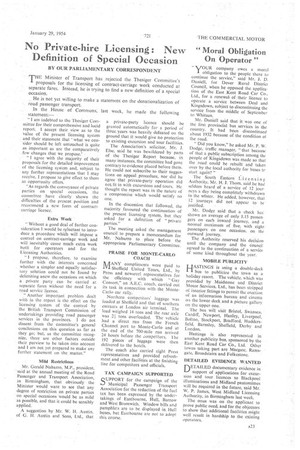No Private-hire Licensing : New Definition of Special Occasion
Page 25

If you've noticed an error in this article please click here to report it so we can fix it.
BY OUR PARLIAMENTARY CORRESPONDENT THE Minister of Transport has rejected the Thesiger Committee's proposals for the licensing of contract-carriage work conducted at separate fires. IriStead, he is trying to find a new definition of a special occasion. •
He is not yet willing to make a statement on the denationalization of road passenger transport. In the ,House of Commons, last week, he made the following • statement:— •
"I am indebted to the Thesiger Committee for their comprehensive and lucid report. I. accept their view as to the value of the present licensing system and their statement that 'what we consider should be left untouched is quite as important as arc the comparatively few changes that we propose.'
"I agree with the majority of their proposals: for the detailed improvement of the licensing system and, subject to any further representations that I may receive, I propose to give effect to them as opportunity offers.
"As regards the conveyance of private parties on special occasions, the committee have clearly shown the difficulties of the present position and recommend a new form of contractcarriage licence. Extra Work
Without a good deal of further consideration I would be rpluctant to introduce a procedure which will impose a control on contract-carriage work and will inevitably cause much extra work both for operators and for the Licensing Authorities.
"I propose, therefore, to examine further with the interests concerned whether a simpler and equally satisfactory solution could not be found by delimiting anew the occasions on which a private party can be carried at separate fares without the need for a road service licence.
"Another important problem dealt with in the report is the effect on the licensing system of the control by the British Transport Commission of undertakings providing road passenger services in the provinces. I do not dissent from the committee's general conclusions on this question as far as they go; but, as the committee recognize, there are other factors outside their purview to be taken into account and I am not yet prepared to make any further statement on the matter." Mild Restrictions
Mr. Gerald Nabarro, M.P., said at the annual meeting of the Passenger and Transport in Birmingham, that obviously Minister would want to see that degree of restriction on private on special occasions would be as as possible, and that it could be applied. A suggestion by Mr. W. H. of G. H. Austin and Sons, Ltd.,
a private-party licence should be granted automatically for a period of three, years was heavily defeated on the ground that it would give no protection to existing excursion and tour facilities.
The Association's solicitor, Mr. J. Else, said he was bewildered by parts of the Thesiger Report because, in many instances, the committee had gone contrary to evidence placed before them. He could not subscribe to their suggestions on appeal procedure, nor did he agree that private-party operation did not tit in with excursions and tours. He thought the report was in the nature of a compromise which would satisfy no one.
In the discussion that followed, the majority .favoured the continuation of the present licensing system, but they asked for a definition of "private parties."
The meeting asked the management council to prepare a memorandum for Mr. Nabarro to place before the appropriate Parliamentary Committee.












































































